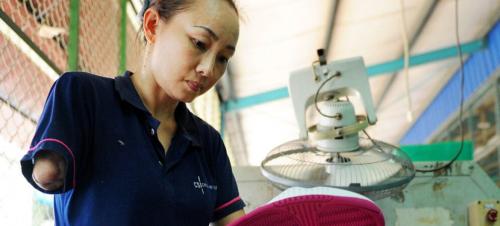Disabilities convention supports ‘inclusive, accessible, and sustainable world’
We have the tools to end the “systemic marginalization” of persons with disabilities, the UN chief told the 15th Conference of States Parties to the Convention on the Rights of Persons with Disabilities on Tuesday.

Many challenges faced by persons with disabilities compared with persons without when it comes to the world of work.
“Together, we can make sure that every person…can fully participate in every aspect of life – social, economic, cultural, and political”, said Secretary-General António Guterres, adding that “we can, and we will, advance our common future.”
Forward motion
He hailed the progress driven by the disability convention as being “broad, swift, and tangible.”
“With 185 ratifications since its adoption in 2006, the Convention has crystallized the commitment of the international community to realize an inclusive, accessible, and sustainable world for all”.
Mr. Guterres noted that 92 per cent of States Parties has adopted national disability laws, more than 60 per cent have taken actions to prohibit discrimination in the labour market, nearly 90 per cent have passed laws protecting the rights of children with disabilities to education, and the percentage of countries with school materials supporting the inclusion of students with disabilities has more than doubled.
COVID factor
Unfortunately, the UN chief said, that progress has been overturned by the COVID-19 pandemic, which has exposed existing inequalities and given rise to new threats.
“Even before the pandemic, persons with disabilities were less likely to enjoy access to education, healthcare, and livelihoods…[and] when COVID-19 struck communities, persons with disabilities were among the worst affected”, he said.
This is also true in armed conflicts, the Secretary-General said, pointing out that “persons with disabilities are often unable to flee the violence and do not receive adequate humanitarian support.”
Reminding that the Convention as well as Resolution 2475 called on Member States to ensure the equal protection of persons with disabilities and provide safe, timely and unimpeded access to humanitarian assistance, he urged States to “fulfil those obligations”.
Steep climb ahead
Fifteen years since the adoption of the Convention, Mr. Guterres highlighted “three critical avenues” to move on, beginning with harnessing technology to enhance inclusion.
“Embracing the promise of technology means closing the digital divide; expanding accessibility and inclusivity; and better protection for people against its perils”, he said.
Second, is to promote economic empowerment and entrepreneurship to advance the participation of persons with disabilities in the labour market on equal terms.
Finally, he called for progress in the climate action arena.
“Persons with disabilities are two to four times more likely to die during hurricanes, tsunamis and other natural disasters,” he pointed out.
‘Cornerstone’ of cooperation
Across all three priorities, the UN chief raised the need for broader cooperation between Governments, international organizations, civil society, and the private sector.
“But the cornerstone…must be the active participation of persons with disabilities in their full diversity, and their full inclusion in all decision-making-processes,” Mr. Guterres said.
“We need the leadership of persons with disabilities, particularly women, and their representative organizations”.
He said action needed to be guided by the “clear and vital call” of persons with disabilities themselves -“Nothing about us, without us”.
Walking the talk
Committed to leading by example, he reminded that the UN Disability Inclusion Strategy is in its third year of implementation, providing “a concrete framework” to comprehensively advance inclusion.
“From headquarters to the field, we are taking a hard look at how we have addressed disability inclusion and accessibility, from our programmes to our internal operations,” he said, attesting that “with the strategy as our roadmap, we are building disability inclusion into our humanitarian, peace and security work”.
He said the UN was working with governments to collect data on persons with disabilities, support the Convention’s implementation. and achieve the 2030 Development Agenda.
And by improving physical and digital accessibility and establishing accessible work systems in UN offices, Mr. Guterres hopes “to be an employer of choice for persons with disabilities”.
Accelerate past the pandemic: Shahid
General Assembly President Abdulla Shahid reminded, via video message, that the conference was themed: “Building disability-inclusive and participatory societies in the COVID context and beyond”.
He spoke at length about how persons with disabilities were disproportionately affected by the pandemic, through “loss of employment, non-inclusive social protection systems, and inadequate assistive technologies.
Advocating for incorporating “the viewpoints of the one billion people living with disabilities”, as we embark on a post-COVID agenda, Mr. Shahid urged the international community to include their views in policy design and implementation.
Source:UN
- 256 reads
Human Rights
Fostering a More Humane World: The 28th Eurasian Economic Summi

Conscience, Hope, and Action: Keys to Global Peace and Sustainability

Ringing FOWPAL’s Peace Bell for the World:Nobel Peace Prize Laureates’ Visions and Actions

Protecting the World’s Cultural Diversity for a Sustainable Future

Puppet Show I International Friendship Day 2020

